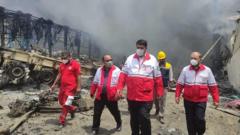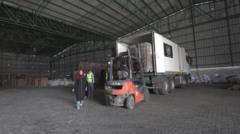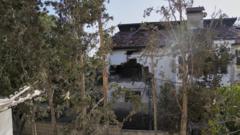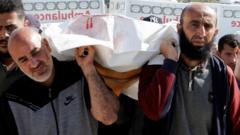The Israeli military has confirmed a targeted airstrike in southern Beirut aimed at infrastructure used by Hezbollah, sparking fears of renewed conflict in the region.
Israeli Military Conducts Airstrike on Beirut Targeting Hezbollah’s Missiles

Israeli Military Conducts Airstrike on Beirut Targeting Hezbollah’s Missiles
Israeli forces launched a strike in Beirut, raising alarms about the potential unraveling of the cease-fire with Hezbollah.
The Israeli military conducted an airstrike on a residential neighborhood in southern Beirut, targeting an area closely affiliated with Hezbollah, a militant group backed by Iran. This strike occurred on Sunday afternoon, as part of a stated effort to eliminate what Israel labeled as infrastructure utilized by Hezbollah to store precision missiles.
Israeli Prime Minister Benjamin Netanyahu and Defense Minister Israel Katz emphasized that their military will not permit Hezbollah to enhance its capabilities or threaten Israel from within Lebanese territory. "The Dahiya neighborhood will not serve as a sanctuary for the terrorist organization Hezbollah," they declared in a joint statement. Moreover, they attributed responsibility to the Lebanese government for not actively preventing such threats.
Following the strike, Lebanese President Joseph Aoun spoke out, asserting that Israel’s actions are destabilizing to the region and pose significant security risks. He urged France and the United States—who are part of the cease-fire accords established post-conflict in November—to take active measures to compel Israel to desist from further attacks. Aoun described the continued Israeli military operations as unacceptable and a violation of Lebanon's sovereignty and territorial integrity.
The recent hostilities raised concerns about the fragile nature of the cease-fire established between Israel and Hezbollah, and highlighted the ongoing tensions in the region.
Israeli Prime Minister Benjamin Netanyahu and Defense Minister Israel Katz emphasized that their military will not permit Hezbollah to enhance its capabilities or threaten Israel from within Lebanese territory. "The Dahiya neighborhood will not serve as a sanctuary for the terrorist organization Hezbollah," they declared in a joint statement. Moreover, they attributed responsibility to the Lebanese government for not actively preventing such threats.
Following the strike, Lebanese President Joseph Aoun spoke out, asserting that Israel’s actions are destabilizing to the region and pose significant security risks. He urged France and the United States—who are part of the cease-fire accords established post-conflict in November—to take active measures to compel Israel to desist from further attacks. Aoun described the continued Israeli military operations as unacceptable and a violation of Lebanon's sovereignty and territorial integrity.
The recent hostilities raised concerns about the fragile nature of the cease-fire established between Israel and Hezbollah, and highlighted the ongoing tensions in the region.




















